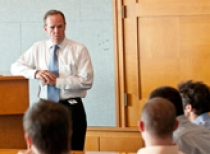Civil Engineering Students Conduct Feasibility Study of Delaware River Crossing
Students enrolled in the course Professional Practices in Civil Engineering have undertaken a project that may one day impact the construction of a fifth Delaware River crossing between Philadelphia and southern New Jersey.
The project is a technical and economic feasibility study in which students are evaluating several options, including a tunnel versus a bridge, and a passenger-rail crossing versus a combined rail-vehicular crossing. Although various agencies have discussed the possibility of building a fifth crossing sometime in the future, the students are the first ones to explore the conceptual planning, preliminary design, and public-policy phases of such a project. In the process, they are collaborating with executives at the Delaware River Port Authority (DRPA) and the Southeastern Pennsylvania Transportation Authority (SEPTA), as well as leading engineers at Hatch Mott MacDonald and Figg Engineering Group.

In September, for example, the students traveled to DRPA headquarters in Camden, NJ, where they received input and feedback from the following experts:
- John J. Matheussen, CEO, DRPA, and President, Port Authority Transit Corporation (PATCO)
- Robert Box, General Manager, PATCO
- William Brooks, Chief Engineer, DRPA
- Byron S. Comati, Director of Strategic Planning and Analysis, SEPTA
In his remarks, Mr. Matheussen assured the students that this collaboration was not merely an academic exercise to satisfy a course requirement. Three years ago, he noted, he had asked Villanova students in the same course to look at five options for extending PATCO’s high-speed rail system. The alternative that the students had ultimately recommended matched the one put forth by the professional engineers whom DRPA had consulted. “Just as your predecessors’ work had an impact, what you do has the potential to have meaning for people, maybe not in three years, but perhaps in ten or twenty years.”
In addition, students are receiving technical support from Randall J. Essex, PE, Executive Vice President and Director of Tunneling at Hatch Mott MacDonald; and from Jay Rohleder, Jr., PE, SE, Senior Vice President, and Josh Smolinsky, Senior Bridge Designer, both at Figg. “Our students are working with top people,” said Prof. Frank Falcone, PE, BSCE ’70, MSWREE ’73, the course instructor. “The level of interaction they have on this project is unlike anything else they’ve experienced at Villanova.” In December, the students will present their final plan and profile for a tunnel, a steel bridge, and a concrete bridge.
The CEE course, which was developed by Professor Falcone and Associate Professor Andrea Welker, PhD, PE, uses a holistic approach to prepare students for professional engineering. By carrying out a project that is large in scope, regional, future oriented, and controversial, students come to understand that the work of engineers has an impact on the economy, the environment, regional planning, and public policy. Built into the project are opportunities for students to learn about leadership, management, organizational theories, corporate cultures, ethical behavior, and group interaction.


